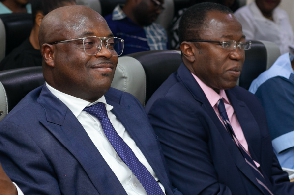On July 4 and 5, 2023, two successful ground-breaking kidney transplant surgeries were performed at the Korle Bu Teaching Hospital.
The procedures were ground-breaking not because they were the first kidney transplantation that had taken place on the hallowed grounds of Korle Bu but because they were the first by a local team of doctors and other health professionals.
Historically, the first successful kidney transplant was performed in Boston in the US in 1954. It was, however, in 2008 that the first kidney transplantations were performed in Korle Bu. The arrangement then was to partner a team of health professionals from Queens Hospital in the UK with support from an NGO called Transplant Links. The team comprised of surgeons, nephrologists, anaesthetists, critical care nurses among others and with their own set of equipment. These professionals from the UK were flown down to perform the surgeries and some would stay back to observe the recovery of the patients.
These rounds of surgeries were helpful but did not meet the vision and ambition of the hospital administration and the local medical team.
While still determined to pursue the vision of localising kidney transplantation, Korle Bu received a shot in the arm when one of its long-time major donors, the First Sky Group and its Executive Chairman, Mr Eric Seddy Kutortse offered to sponsor the kidney transplant procedures in Korle Bu.
Through collaboration, the hospital and First Sky Group succeeded in bringing down the Transplant Links in 2019 to perform kidney transplant for four patients. This marked the end of bringing in expatriate team and set the stage for the new paradigm of localising kidney transplantation in Korle Bu.
On assumption of office, the Chief Executive of the Korle Bu Teaching Hospital, Dr Opoku Ware Ampomah had a vision to deepen and firmly establish not just kidney but tissue transplantation for other organs and parts of the body. The visions of the two men and their respective teams merged and resulted in assembling the local transplantation team. At this juncture, special mention must be made of Prof J.E. Mensah, Prof Vincent Boima, Dr Kwabena Adade and Prof Mathew Kyei, and their respective teams who are the main drivers of the kidney transplantation programme in Korle Bu.
While First Sky Group committed to providing the required finances for the procedures, the local transplant team laboured in its preparatory works, leaving no stone unturned to guarantee nothing but success.
The multi-disciplinary team that ensured the success of the operations and deserves our commendations comprises of nephrologists, surgeons, anaesthetists, critical care doctors and nurses, perioperative nurses, ward nurses, clinical psychologists, pharmacists, dieticians, radiologists and radiographers, cardiologists, biomedical engineers, orderlies, accountants, administrative staff, and other clinical non-clinical staff.
The team was supported by Dr Rajeev Sood, an experienced Indian transplant surgeon who also deserved our commendation was on hand to play a critical supervisory role. He was accompanied by an instruments technician.
After the successful first attempt, plans are underway to perform a second round of kidney transplantations in Korle Bu this month - August 2023. As the procedure picks up and becomes routine, the 1000 end-stage patients on dialysis across the country, may have to exit the tri-weekly dialysis at a point. The current regime of accepting only donations from family may become a barrier to some patients if no compatible member of the family is found.
As Korle Bu and its partners forge ahead to institutionalise kidney and other transplantations locally, it is imperative to support the hospital with an enabling legal framework that facilitates the donation, harvesting and storage of organs for transplantation. The Ministries of Health and Justice as well as Parliament must gird their loins to help provide the required legislation to fully establish this emerging frontier in our healthcare services.
If the necessary legislation are passed, the pain, financial and other difficulties Ghanaians go through in accessing kidney and related transplantation services abroad will reduce to the barest minimum. For instance, an average of GHS 700,000 will be required to undergo kidney transplant outside Ghana when this could be done at a fraction of the cost locally. Therefore localising kidney transplants as being done in Korle Bu now is commendable and should be supported by all.
In conclusion, the ground-breaking feat chalked by Korle Bu has taken place 70 years after the first kidney transplant in the US. This feat by our own staff holds great promise in ameliorating the suffering of our renal patients and their families. It will also assist in cementing Ghana's claim as the hub of health tourism in the West Africa sub-region. All hands must therefore be on deck to guarantee ultimate success.
Ghana’s leading digital news platform, GhanaWeb, in conjunction with the Korle-Bu Teaching Hospital, is embarking on an aggressive campaign which is geared towards ensuring that parliament passes comprehensive legislation to guide organ harvesting, organ donation, and organ transplantation in the country.
Opinions of Wednesday, 9 August 2023
Columnist: Mustapha Salifu



















